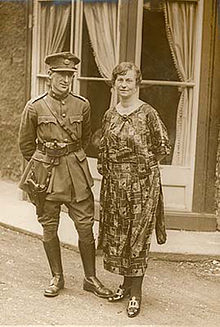Richard Mulcahy
Richard James Mulcahy ( Irish Risteárd Séamus Ua Maolchatha , also Ó Maolchatha ) (born May 10, 1886 in Waterford , County Waterford , † December 16, 1971 in Dublin ) was an Irish general , politician of the Fine Gael and several ministers.
Life
Mulcahy took part in the Easter Rising as a lieutenant as early as 1916 and was subsequently sentenced to internment in Frongoch prison. After his release, he was elected Member of Parliament ( First Dáil ) in December 1918 , where he represented the interests of Sinn Féin in the Dublin- Clontarf constituency. In the same year he became a member of the Irish Republican Brotherhood and Chief of Staff of the Irish Volunteers . The following year he was appointed assistant to the defense minister, a position he held until 1921. In the following years Mulcahy had a leading role in the fighting and skirmishes before the armistice of July 1921. His assessment of the military situation ultimately led to his being instrumental in supporting the peace treaty of December 1921. In 1921 he was again elected member of the Dáil Éireann , where he represented the interests of Dublin until 1937.
After the establishment of the Irish Free State , President Arthur Griffith appointed him Secretary of Defense in the Provisional Government under Michael Collins from January to August 1922 . After Collins's death in August 1922 he succeeded him as General and Commander-in-Chief of the Armed Forces of the Free State and at the same time chiefly responsible for the conduct of the operations against the irregular forces in the Irish Civil War .
In September 1922 he was appointed Secretary of Defense in the government of William Thomas Cosgrave and held that post until his resignation in March 1924. He returned to government in 1927 after Cosgrave had appointed him Minister of Local Administration and Public Health. He remained in this office until the replacement of Cosgrave as Chairman of the Executive Council (Premier) by Éamon de Valera on March 9, 1932. In 1938, after a one-year break, he was again elected as a member of the Lower House and belonged to it as a representative of a constituency in Dublin until 1943 on.
After Mulcahy was re-elected MP in 1944 after another one-year hiatus, he was also elected chairman of Fine Gael to succeed Cosgrave . The actual strong man of the party, however, was John A. Costello , who was considered far less controversial than Mulcahy and who was leader of the Fine Gael in the House of Commons between 1948 and 1959.
During the coalition government led by Costello, Mulcahy was also Minister of Education from February 1948 to June 1951 and again from June 1954 to March 1957. From June to October 1956 he was also first Minister for the Irish-speaking areas ( Gaeltacht ).
1959 resigned both Mulcahy as party chairman and Costello as party leader in the Dáil Éireann. These positions were then united and assumed by James Dillon .
Web links
| personal data | |
|---|---|
| SURNAME | Mulcahy, Richard |
| ALTERNATIVE NAMES | Mulcahy, Richard James; Ó Maolchatha, Risteárd Séamus; Ó Maolchatha, Risteárd; Including Maolchatha, Risteárd Séamus; Including Maolchatha, Risteárd; Ó Maolchatha, Risteard Séamus; Ó Maolchatha, Risteard; Including Maolchatha, Risteard Séamus; Including Maolchatha, Risteard |
| BRIEF DESCRIPTION | Irish general, Fine Gael politician and multiple minister |
| DATE OF BIRTH | May 10, 1886 |
| PLACE OF BIRTH | Waterford , County Waterford |
| DATE OF DEATH | December 16, 1971 |
| Place of death | Dublin |

